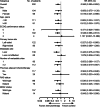XELOX (capecitabine plus oxaliplatin) plus bevacizumab (anti-VEGF-A antibody) with or without adoptive cell immunotherapy in the treatment of patients with previously untreated metastatic colorectal cancer: a multicenter, open-label, randomized, controlled, phase 3 trial
- PMID: 38565886
- PMCID: PMC10987514
- DOI: 10.1038/s41392-024-01788-2
XELOX (capecitabine plus oxaliplatin) plus bevacizumab (anti-VEGF-A antibody) with or without adoptive cell immunotherapy in the treatment of patients with previously untreated metastatic colorectal cancer: a multicenter, open-label, randomized, controlled, phase 3 trial
Abstract
Fluoropyrimidine-based combination chemotherapy plus targeted therapy is the standard initial treatment for unresectable metastatic colorectal cancer (mCRC), but the prognosis remains poor. This phase 3 trial (ClinicalTrials.gov: NCT03950154) assessed the efficacy and adverse events (AEs) of the combination of PD-1 blockade-activated DC-CIK (PD1-T) cells with XELOX plus bevacizumab as a first-line therapy in patients with mCRC. A total of 202 participants were enrolled and randomly assigned in a 1:1 ratio to receive either first-line XELOX plus bevacizumab (the control group, n = 102) or the same regimen plus autologous PD1-T cell immunotherapy (the immunotherapy group, n = 100) every 21 days for up to 6 cycles, followed by maintenance treatment with capecitabine and bevacizumab. The main endpoint of the trial was progression-free survival (PFS). The median follow-up was 19.5 months. Median PFS was 14.8 months (95% CI, 11.6-18.0) for the immunotherapy group compared with 9.9 months (8.0-11.8) for the control group (hazard ratio [HR], 0.60 [95% CI, 0.40-0.88]; p = 0.009). Median overall survival (OS) was not reached for the immunotherapy group and 25.6 months (95% CI, 18.3-32.8) for the control group (HR, 0.57 [95% CI, 0.33-0.98]; p = 0.043). Grade 3 or higher AEs occurred in 20.0% of patients in the immunotherapy group and 23.5% in the control groups, with no toxicity-associated deaths reported. The addition of PD1-T cells to first-line XELOX plus bevacizumab demonstrates significant clinical improvement of PFS and OS with well tolerability in patients with previously untreated mCRC.
© 2024. The Author(s).
Conflict of interest statement
The authors declare no competing interests.
Figures



References
Publication types
MeSH terms
Substances
Supplementary concepts
Associated data
Grants and funding
LinkOut - more resources
Full Text Sources
Medical

